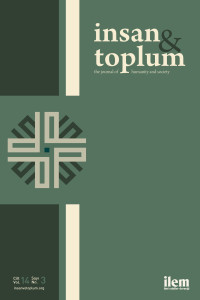Öz
Cumhurbaşkanı ve devlet başkanlarının sahip olduğu klasik yetkilerden birisi de af yetkisidir. Bu yetkinin sınırları ve kullanımı ülkeden ülkeye farklılık göstermektedir. Genel af, mahkumiyete ilişkin bütün sonuçları ortadan kaldırırken, özel af ise sadece infaz rejimine yönelik bir husustur. Türk anayasal sisteminde Cumhurbaşkanı; sürekli hastalık, kocama ve sakatlık sebepleriyle hükümlülerin cezalarını hafifletme ve kaldırma yetkisine sahiptir. Tanımları bağlamında değerlendirildiğinde 1924, 1961 ve 1982 anayasalarında yer alan Cumhurbaşkanının af yetkisinin bireysel özel af olduğu ifade edilebilir. Cumhurbaşkanının özel af yetkisi siyaset biliminin, kamu yönetiminin, anayasa hukukunun, idare hukukunun, ceza hukukunun ve adli tıbbın ilgi alanına giren multidisipliner bir nitelik ihtiva etmektedir. Cumhurbaşkanı Ahmet Necdet Sezer döneminde terör suçlarından hükümlü olanlara yönelik af sürecinin yoğun olarak işletilmesi, kamuoyunun dikkatini bu alana çekmiştir. Süreç içerisinde kamuoyu tarafından yakından tanınan kimselere yönelik özel af süreci işletilmesi durumlarında da Cumhurbaşkanının özel af uygulamaları kamuoyunun ilgisini çekmesine rağmen muhtemelen yukarıda zikredilen multidisipliner nitelik nedeniyle konu akademik anlamda görece az ilgi çeken bir alanda kalmıştır. Çalışmada ilk önce Cumhurbaşkanına tanınan özel af yetkisinin teorik temelleri ve altyapısı ele alınmıştır. Devamında ise konunun anayasal temeli, Cumhurbaşkanının af yetkisinin şekli, niteliği ve sınırları, özel af kararnameleri ışığında incelenmiştir.
Anahtar Kelimeler
Türk Siyasal Hayatı Bireysel Özel Af Cumhurbaşkanı Anayasa Kararname.
Kaynakça
- Kuzu, B. (2001) Af müessesesi ve düşünceleri açıklama özgürlüğü. Anayasa Yargısı, 17(1), 254-297.
- Mecit, K. (2009). İnfaz hukuku. Ankara: Adalet.
- Metin, M. (2020). Celal Bayar’ın Kayseri cezaevinden tahliyeleri, affı ve Uluslararası Af Örgütünün bu konudaki çabaları. Uluslararası Beşeri Bilimler ve Eğitim Dergisi, 6(13), 375-394.
- Odyakmaz, Z. (2001). 1982 Anayasası açısından bireyin aftan yararlanmayı reddetme hakkı. Anayasa Yargısı, 17(1), 364-378
Öz
One of the classic powers of the president and heads of state is the power of amnesty. The limits and use of this authority differ from country to country. While the general amnesty eliminates all the consequences of conviction, the special amnesty is only a matter for the execution regime. In the Turkish constitutional system, the President has the authority to commute or remit the sentences imposed on persons, on grounds of chronic illness, disability or old age. When evaluated in the context of its definitions, it can be stated that the President’s power of amnesty included in the 1924, 1961 and 1982 constitutions is special amnesty. The special amnesty power of the President has a multidisciplinary nature that is within the scope of political science, public administration, constitutional law, administrative law, penal law and forensic medicine. The intense execution of the amnesty process for those convicted of terrorist crimes during the President Ahmet Necdet Sezer period drew the attention of the public to this area. The President’s special amnesty practices attract the attention of the public in cases where this process is run for people who are well known by the public. However, probably due to the multidisciplinary nature mentioned above, the subject remained in an area of relatively little academic interest. In the study, firstly, the theoretical foundations and infrastructure of the special amnesty granted to the President are discussed. Afterwards, the constitutional basis of the issue, the shape, nature and limits of the President’s power of pardon were examined in the light of the special amnesty decrees.
Anahtar Kelimeler
Turkish Political Life Individual Special Amnesty President Constitution Decree
Kaynakça
- Kuzu, B. (2001) Af müessesesi ve düşünceleri açıklama özgürlüğü. Anayasa Yargısı, 17(1), 254-297.
- Mecit, K. (2009). İnfaz hukuku. Ankara: Adalet.
- Metin, M. (2020). Celal Bayar’ın Kayseri cezaevinden tahliyeleri, affı ve Uluslararası Af Örgütünün bu konudaki çabaları. Uluslararası Beşeri Bilimler ve Eğitim Dergisi, 6(13), 375-394.
- Odyakmaz, Z. (2001). 1982 Anayasası açısından bireyin aftan yararlanmayı reddetme hakkı. Anayasa Yargısı, 17(1), 364-378
Ayrıntılar
| Birincil Dil | Türkçe |
|---|---|
| Konular | Siyaset Bilimi (Diğer) |
| Bölüm | Araştırma Makaleleri |
| Yazarlar | |
| Yayımlanma Tarihi | 4 Eylül 2024 |
| Gönderilme Tarihi | 8 Nisan 2024 |
| Kabul Tarihi | 30 Haziran 2024 |
| Yayımlandığı Sayı | Yıl 2024 Cilt: 14 Sayı: 3 |

